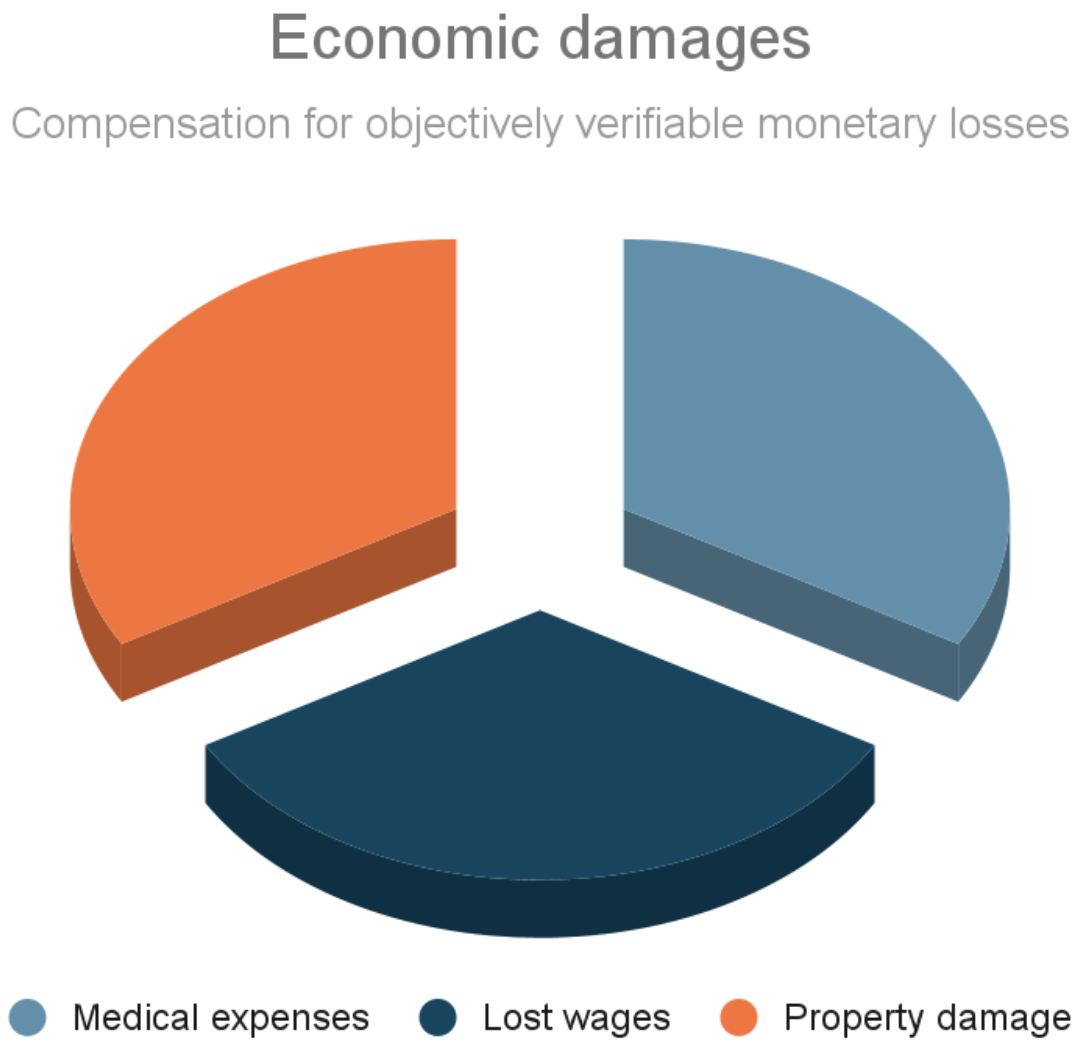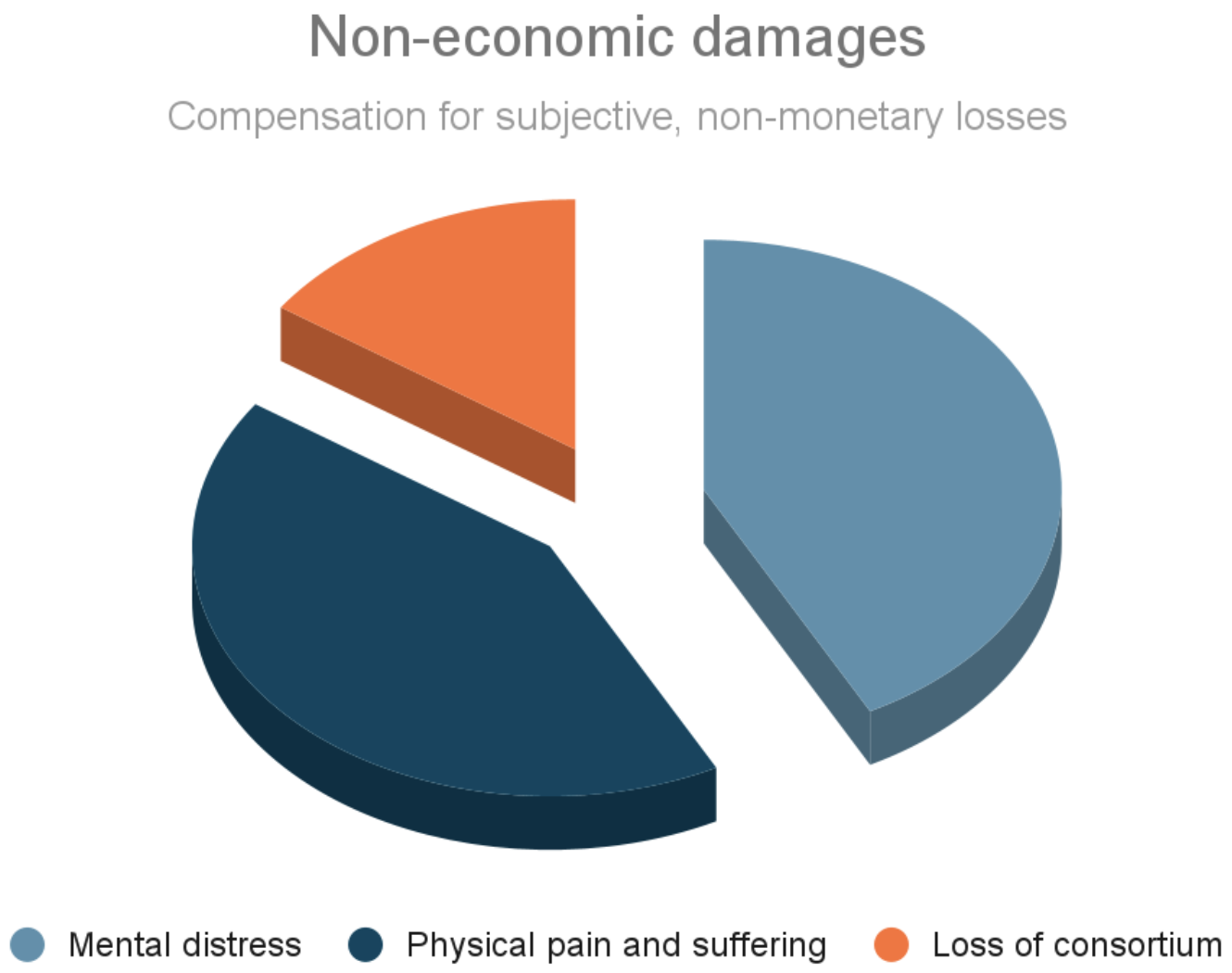Find out what types of damages you can recover and whether there are any damage caps
One of the primary goals of an Alabama personal injury lawsuit is to receive compensation from the person or entity legally responsible for your injuries.
The legal term for the compensation you receive in a personal injury lawsuit is “damages.”
The amount of damages you receive may be agreed to as part of a settlement or may be decided by a judge or jury after a civil trial.
Before you start adding up the damages you believe you deserve, it’s important to understand the types of damages available, damage caps and other factors that may reduce your damages in Alabama.
Compensatory damages
Compensatory damages (sometimes called “actual damages”) are intended to compensate you for the losses caused by your injury.
“The amount [of compensatory damages] awarded shall be precisely commensurate with the injury suffered, neither more nor less.” - Birdsall v. Coolidge, 93 U.S. 64 (1876)
Compensatory damages can be further broken down into economic damages and non-economic damages.
Let’s take a closer look at each.
Economic damages
Economic damages (sometimes called “special damages”) are intended to compensate you for the objectively verifiable monetary losses that result from your injuries.
Examples of economic damages include:
- Medical expenses. Injuries typically require medical treatment. In Alabama, you’re entitled to reimbursement for all “reasonable and necessary” medical expenses you incur as a result of your injury (including the future medical expenses you will have to pay after your case is resolved). Examples of medical expenses include hospital stays, emergency room visits, physical therapy sessions, surgeries, prescriptions, mental health counseling and even the cost of traveling to and from medical facilities.
- Lost income. In Alabama, you’re entitled to reimbursement for any lost income that results from your injury. For example, if you miss 2 weeks of work because you were in the hospital, you’re entitled to the wages you would have earned during that 2-week period. What’s more, if your injury results in a disability that reduces your future ability to earn, you’re entitled to compensation for that loss.
- Property damages. If your personal property (such as your car or an item of clothing) is damaged in an accident, you’re entitled to reimbursement for the cost of replacing or repairing that property.
Non-economic damages
Non-economic damages (sometimes called “general damages”) are intended to compensate you for the subjective, non-monetary losses caused by your injury. Non-economic damages are difficult to prove, but keeping good records can help.
Non-economic damages include:
- Mental distress. Recovery for damages for mental suffering is permitted in Alabama so long as the mental suffering is accompanied by a physical injury.
- Physical pain and suffering. You’re entitled to compensation for the past and future physical pain and suffering that you experience as a result of your injuries. Pain is subjective, and, as a result, insurance companies, judges and juries have to rely on a number of factors when attempting to determine the value of your pain and suffering, including the type of injury and length of recovery.
- Loss of consortium. In Alabama, you can make a claim for loss of consortium of a spouse who has been physically injured. “Consortium” is defined as the right to your spouse’s “company, fellowship, cooperation and assistance in the marital relationship as a partner in the family unit.”
Punitive damages
Punitive damages are intended to punish the defendant for their actions and deter similar conduct in the future.
In Alabama, punitive damages are only awarded in 2 types of cases:
- Wrongful death cases
- Tort actions in which the defendant deliberately engaged in oppression, fraud, wantonness or malice
Attorneys fees
Alabama follows what is known as the “American rule.” The American rule states that the losing party is generally NOT required to pay the winning party’s attorney’s fees.
There are a couple of narrow exceptions to this general rule, including instances in which the recovery of attorney fees is provided for by statute or contract.
Damage caps
Alabama used to have laws that limited the amount of damages you could recover in certain situations. However, most of these laws were declared unconstitutional.
Currently, there are only 2 damage caps in Alabama:
- Compensatory damages in wrongful death cases. Alabama is the only state in the country that denies recovery for compensatory damages (economic and non-economic damages) in wrongful death claims. Only punitive damages are recoverable in wrongful death cases.
- Punitive damages in civil actions. Punitive damages in civil actions that do not involve physical injury must not exceed 3 times the amount of compensatory damages or $500,000, whichever is greater. With respect to civil actions that do involve physical injury, punitive damages must not exceed 3 times the amount of compensatory damages or $1.5 million, whichever is greater.
Estimating the value of your claim
Insurance adjusters and attorneys often use a simple formula to estimate how much a person’s claim is worth. The formula is as follows:
Economic damages x 1-5 (depending on the severity of the injury)
+ lost income
= damages
Keep in mind that this is only a starting point. The final amount awarded to a plaintiff can go up or down significantly depending on a number of factors, such as:
- Quality of the evidence
- Length of recovery
- Permanence of the injury
- Likeability of the plaintiff
- The jury pool
When Sharon’s physician’s discharge summary was transcribed, it contained several critical errors, including the dosage of insulin, which was written as 80 units instead of 8 units.
Sharon died as a result of the mistakes in her discharge summary.
A subsequent investigation found that Thomas Hospital hired unqualified transcriptionists in India and ignored valid complaints about the transcriptionists.
At the end of the 2-week trial, the attorney representing Sharon’s estate asked the jury to award $70 million in punitive damages. The jury deliberated and awarded $140 million.
To date, this $140 million award is one of the largest in Alabama history.
Factors that may reduce your damages
Alabama requires plaintiffs to take steps to minimize or “mitigate” the harm they suffer. If a plaintiff fails to mitigate their damages, their damage award may be reduced.
How do you mitigate damages?
Follow your doctor’s orders and avoid participating in activities (such as sports) that might aggravate your injury or slow your recovery time.
Second, keep track of all your medical expenses. Additionally, keep track of your injuries' impact on your day-to-day life (for purposes of supporting a pain and suffering or emotional distress claim).

Damages worksheet to track expenses for your injury claim (medical treatment, property damage, lost wages, prescriptions)
Download in PDF format

Sample accident journal/diary to help you document the effect on your daily life
Download in PDF format
Finally, it’s important to remember that Alabama is a pure contributory negligence state. This means that if a plaintiff is even 1 percent responsible for causing their injuries, they’re barred from recovering ANY damages.
To maximize your damage award, it’s a good idea to meet with a personal injury attorney. Most initial consultations are free. You can find an experienced Alabama personal injury attorney in your area using our free online directory.
See our guide Choosing a personal injury attorney.




